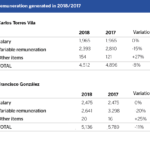BBVA releases its annual compensation report for board members
BBVA published its annual compensation report for Board members today, which details how compensation is tied to the bank’s results. The Board also approved a new compensation policy for Board Members for 2019-2021. Both documents will be presented at the Annual General Meeting on March 15, 2019.

Despite the BBVA Group’s excellent results in 2018, with net attributable profit up 51.3 percent at €5.32 billion, variable compensation for executive directors dropped in the same period. This decline is due to some financial indicators falling below the targets set for 2018 - despite improvement from 2017 - primarily due to economic imbalances in Turkey and Argentina.
The current Group executive chairman, Carlos Torres Vila earned a total of €4.5 million in 2018 as CEO - 8 percent less than in 2017.
His fixed salary remained constant from 2017 at €1.96 million, while his variable compensation fell 15 percent from 2017 at €2.4 million.
Carlos Torres Vila’s pension plan remains €1.6 million - the annual retirement contribution that was set in 2017. His defined contribution plan includes annual contributions that are clearly established beforehand. He cannot receive the retirement pension in advance, or in case of a serious breach of duty.
Meanwhile, the current CEO Onur Genç did not receive any compensation for his new role in 2018. His fixed and variable compensation in 2018 came from his previous role of BBVA Compass CEO and country manager in the U.S. His fixed salary totalled €2.2 million and variable compensation was €980,000.
Former Group executive chairman Francisco González’s total compensation in 2018 was €5.1 million - 11 percent less than the previous year. His fixed salary stood at €2.5 million, while his variable compensation dropped 20 percent from 2017 at €2.6 million.
According to the policy, 40 percent of the previously mentioned variable compensation is to be paid in the first quarter of 2019 - half in stock and the other half in cash. The remaining 60 percent is a deferred payment that is subject to multi-annual indicators that can reduce, or even drop the amount to zero, but never increase it. This deferred component of the variable compensation will not start to be paid until 2022, and it will be 60 percent in stock and 40 percent in cash. The entire variable compensation is subject to malus clauses, which could limit or prevent its collection, and clawback clauses, which could allow the bank to recover payments that have already been made.
In relation to the variable compensation declines in 2018 (year-on-year), even though four financial indicators improved from the previous year [net attributable profit without corporate operations, return on regulatory capital (RORC), risk adjusted return on economic capital (RAROEC) and efficiency ratios], performance for three indicators (all except for RAROEC) fell below the target set for the year. This is primarily due to economic imbalances in Turkey and Argentina whose performance was affected by exchange rates and the negative accounting impact for hyperinflation in Argentina.
In order to determine variable compensation in 2019, the Board maintained the following indicators: Net attributable profit without corporate operations, RORC, the efficiency ratio and the Net Promoter Score. It also added two new indicators: the tangible book value - related to creating value for shareholders - and digital sales. The Board also eliminated the RAROEC indicator in order to avoid duplication with the RORC indicator after IFRS9 entered into force.
New elements in the compensation policy
The Board will present the updated version of the 2017 compensation policy at the Annual General Meeting (AGM) for approval. The purpose is to incorporate the contractual conditions of the new Group executive chairman (Carlos Torres Vila) and the new CEO (Onur Genç), as well as some technical improvements. If approved at the AGM, this policy will remain in force for 2019-2021.
Fixed compensation in 2019 is set at €2.45 million for chairman Carlos Torres Vila, and €2.18 million for CEO Onur Genç. The new policy also establishes that the annual fixed compensation can not increase more than 5 percent annually, on average, during the validity of said policy.
With regards to CEO Onur Genç he will receive accidental death and disability insurance, as well as two complementary forms of compensation due to his condition of high-ranking international executive:
- The first is an annual cash payment, equivalent to 30 percent of his annual fixed salary (cash in lieu of pension).
- The second is an annual cash payment of €600,000 as compensation for relocation.
The variable compensation for board members remains unchanged.
